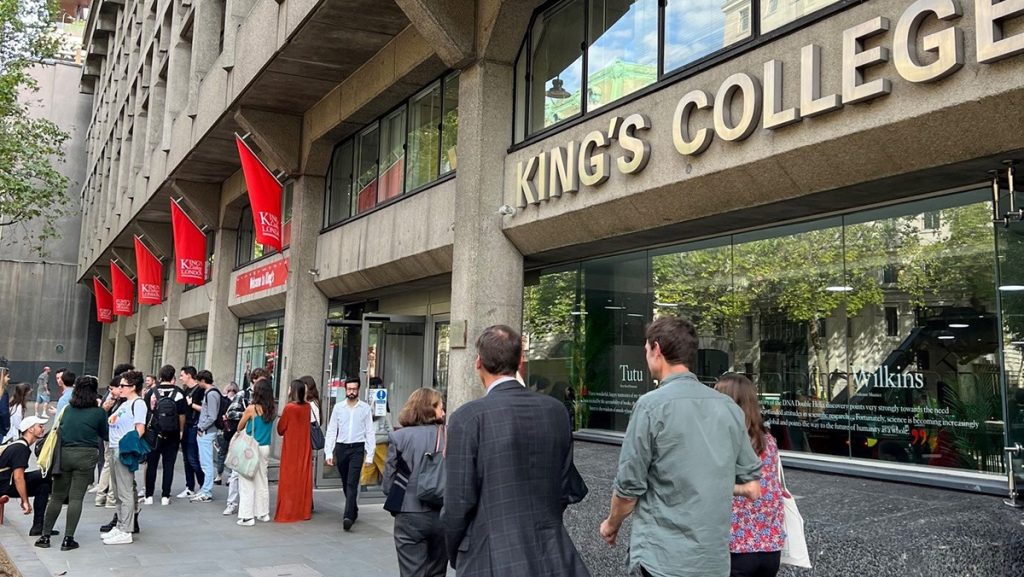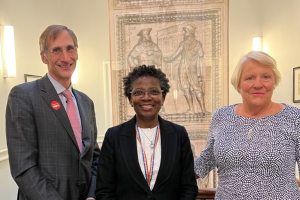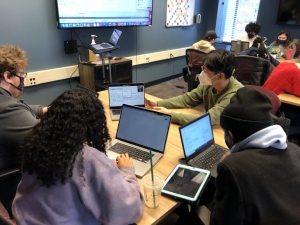More than 1,000 undergraduate students have spent time at the partner campus, and hundreds of faculty members are involved in collaborative activities between the two universities, yielding more than 800 joint publications.

For the first time since the start of the pandemic, a group of UNC-Chapel Hill senior leaders and staff traveled to King’s College London in September. One of Carolina’s longest-standing strategic partners, the UNC-King’s Strategic Alliance was established in 2005.
“It was terrific to visit our partners at King’s again,” said Barbara Stephenson, vice provost for Global Affairs. “Both UNC-CH and KCL are enthusiastic about continuing and, in some cases, resuming our engagement now that pandemic-related travel restrictions have eased considerably. We also identified new areas for potential growth in the coming years.”
More than 1,000 undergraduate students have spent time at the partner campus, and hundreds of faculty members are involved in collaborative activities between the two universities, yielding more than 800 joint publications.
“UNC’s relationship with King’s College London is one of the most enduring and wide-reaching partnerships we have,” said Rudi Colloredo-Mansfeld, senior associate dean for social sciences and global programs in the College of Arts and Sciences. “It’s a true collaboration of research and teaching activities as well as student exchanges. Both institutions are made stronger by this alliance.”

More than 20 diverse academic departments and professional schools collaborate with KCL, with noticeably strong ties in the humanities and social sciences.
The history department has worked with King’s since 2005 – longer than any other department at UNC-Chapel Hill. It’s also one of the only departments that continued KCL collaborations throughout the pandemic through virtual engagement.
Chad Bryant, professor and departmental KCL liaison in Carolina’s history department, built on his years of collaboration with Jim Björk, reader in modern European history at King’s College London, to connect their students online.
In spring 2021, Bryant used a Collaborative Online International Learning, or “COIL,” award in HIST 783, Introduction to Russian, Eurasian and East European History, to partner with KCL and Charles University in the Czech Republic. He’s implementing COIL in the course again this semester and said that it’s an experience beneficial to both students and faculty leading the discussions.
“Everyone comes away, I hope, with a sense of appreciating academic cultural differences as well as the pleasure of meeting people from different parts of the world,” said Bryant.
In addition to Bryant, five Carolina faculty have taught COIL courses with their counterparts at King’s since Carolina launched its COIL program in fall 2020.
Bryant also helped initiate the UNC-King’s College London Workshop on Transatlantic Historical Approaches, a graduate student workshop that has been running for 12 years. The workshop brings together students from both universities twice yearly. In the spring, the first part of the workshop is held in London. In the fall, it comes to Chapel Hill. The departments continued the workshops virtually during the pandemic.
“It’s always a pleasure to see graduate students learn from each other and find various connections,” said Bryant. “The workshop has been the mainstay of our collaboration and something that we mention when recruiting potential graduate students into our program.”
The classics department is another strong area of collaboration with KCL.
Emily Baragwanath, associate professor with Carolina’s classics department, instructs an undergraduate capstone course in the department titled “Junior Seminar: Delphi.” She invited KCL’s Emily Pillinger, senior lecturer in Latin language and literature, and Hugh Bowden, professor of ancient history, to serve as virtual guest lecturers in “Literary and Historical Perspectives on Prophesy in the Classical Period,” an event in connection with the course in spring 2022.
“This international collaboration — which entailed two international scholars speaking about their cutting-edge research on themes of the seminar — was a highlight of the semester,” said Baragwanath. “Students experienced the excitement of cross-continental research collaboration. The students posed questions of the scholars and thereby gained valuable new perspectives on topics their own papers were exploring.”
Engagement between the two institutions continues to evolve and expand. One new area of collaboration between the two institutions involves Carolina’s Digital Literacy and Communications Lab.

In spring 2022, UNC-Chapel Hill’s Courtney Rivard, teaching associate professor and director of DLC, instructed ENGL 118, Storytelling and Game Development. With support from a COIL award, she collaborated with KCL’s Feng Zhu, lecturer in games and virtual environments, and Connor McKeown, teaching fellow in digital humanities. They engaged students from both universities in major theories and concepts in game design. Throughout the semester, students at both institutions completed workshops together on basic game design, read the same selected texts and watched McKeown livestream several games.
“The experience of partnering with KCL opened students’ perspectives to see how people from other places in the world experienced story and narrative through games,” said Rivard.
The Institute for Arts & Humanities King’s College Fund contributes to the sustainability of these departments’ partnerships with KCL. The fund enables UNC-Chapel Hill faculty and graduate students to apply for support for projects and collaborative events between UNC-Chapel Hill and KCL. Currently, eight CAS departments participate.
The UNC-KCL partnership is unique and successful, given the wide range of academic areas involved. CAS is partnered with King’s in 23 departments, including 12 humanities, eight social sciences and three natural sciences.
There are also several professional schools involved, including the School of Medicine; the Eshelman School of Pharmacy; the Gillings School of Global Public Health; the School of Information and Library Sciences; the Graduate School; and the School of Law.
The Adams School of Dentistry has partnered with King’s College London and two other international universities to establish the DentAlliance with the goal to advance and transform research, education and practice in dentistry and the oral and craniofacial health sciences.
Faculty and staff who are interested in pursuing an engagement or thinking about collaborating with counterparts at King’s may contact the partnerships team in the Office of the Vice Provost for Global Affairs.
By Rawan Abbasi ’20, UNC Global
